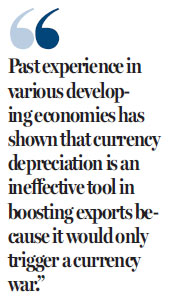HK must look at the long-term impact of shrinking renminbi
Updated: 2016-10-27 09:52
By Peter Liang(HK Edition)
|
|||||||||
In searching for a rationale explanation for the stock market drift in recent weeks, investment analysts have put the blame on growing concern over the depreciation of the Chinese yuan.
But, nobody has said why Hong Kong should care about the yuan's dwindling value against the dollar. In the short term, at least, a weakening yuan is widely seen as bullish for investment in Hong Kong-dollar denominated assets, such as stocks and properties.
The latest stocks rally was actually fueled, at least partly, by the inflow of investment funds from around the region, including the mainland. Expectations of further depreciation of the yuan could prompt more mainland investors to park a greater part of their money in Hong Kong-dollar assets.

A weak yuan will also have the effect of lowering prices in Hong Kong dollar terms of mainland imports, including foodstuff and a wide range of consumer goods. Cheaper mainland imports would benefit, particularly, the lower-income families who have been badly squeezed by soaring rentals, as well as stagnant wages.
On the other hand, the strong dollar is hurting Hong Kong's bid for more mainland tourists who make up the bulk of incoming visitors. But, net income from tourism accounts for less than 6 percent of the city's total economic output. A decline in this sector will cause a noticeable dent on GDP growth.
In the longer term, there're reasons to be worried about the weakening yuan, not so much for its direct impact on Hong Kong's economy, but for what it may imply. The mainland authorities have reiterated that it was never their intention to boost exports through currency depreciation.
To do that would be self-defeating because the mainland imports a vast amount of manufacturing intermediary materials and components to feed its industries. Driving down the value of the yuan would push up manufacturing costs, limiting the effect of currency depreciation on sale prices.
Past experience in various developing economies has shown that currency depreciation is an ineffective tool in boosting exports because it would only trigger a currency war. Most worrisome to Hong Kong investors is that the yuan's depreciation could indicate further slowdown of the mainland economy next year.
That matters to Hong Kong as the local economy has become so closely integrated with that of the mainland.
(HK Edition 10/27/2016 page1)